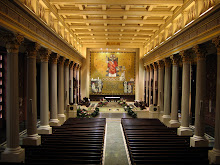My next article in the Catholic Telegraph runs this week:
Jesus’ very last words in the Gospel of Matthew form a basis for the foundation and structure of the Church: “Behold, I am with you always, even until the end of the age.” As He says these words to the Eleven, He is taken back up into the glory of Heaven, entrusting His closest collaborators with continuing the mission He had been given by His Father from the foundation of the world. The Eleven (who soon return to Twelve) are to go forth and ‘teach all nations, baptizing them in the name of the Father, and of the Son, and of the Holy Spirit.’
What we see developing in this passage is that the authority that Jesus has exercised throughout his public ministry is now shared and passed on to the Twelve. They are able to do great things, as we see in the Acts of the Apostles, not on their own, but through their ongoing connection with Jesus Christ. Through His power, we see Peter, James and John curing the sick, performing miracles and even raising people from the dead.
This authority did not die with St. John, the last of the Apostles. Rather, we see in the later stages of the Acts of the Apostles and in the writings of St. Paul that this authority was handed to their successors through the laying on of hands: St. Matthias is made one of the Twelve through this ancient sign in the first chapter of Acts; Timothy and Titus are established as ‘Episcopoi’ or Elders later on in the same book. These early Elders pass on their authority to their successors, and it has been handed down right to our very day through this same sign of laying on of hands by at least three of his brother bishops.
The Catechism of the Catholic Church picks up these themes in discussing the Sacrament of Holy Orders. Paragraph 1536 states: ‘Holy Orders is the sacrament through which the mission entrusted by Christ to His apostles continues to be exercised in the Church until the end of time: thus it is the sacrament of apostolic ministry. It includes three degrees: episcopate, presbyterate and diaconate.’ Through the leadership of the bishop, his coworkers in the priests and the assistance given by the deacons, Christ continues to lead and shepherd His Church.
This leadership is exercised in three ways by our bishops, who delegate some of their authority to their priests: to teach, to sanctify and to govern. The Catechism continues, in paragraph 888, that the bishop’s first responsibility is to preach the Gospel to all people, not just the faithful. He, together with the entire college of bishops and united under the leadership of the Holy Father, has been entrusted with caring for the deposit of faith, and his task, as commissioned at Vatican II, is to “present Christian doctrine in a manner adapted to the needs of the times.”
The Decree concerning the Pastoral Office of Bishops continues that this pastoral ministry of teaching is not just for Catholics, but for all. The Bishop has a responsibility for every soul that resides in his diocese, ‘whether they be believers or not.’
In our world today, this is an area which modern society has sought to relegate the teaching office of the bishops to the side. During political debates; pundits often remark that the bishops should stick to their own matters in the faith. Yet, before God and men, they have the responsibility to lead the faithful in their apostolates of converting the world into a closer resemblance to the Kingdom of God.
Finally, this concern for the salvation of all souls in the diocese has a familial dimension. The Church is identified as the living Body of Christ, one family united in prayer before God. The leadership and pastoral care of the bishop enables this unity to come to fruition. Therefore, it is the responsibility and task of all the faithful to pray for their shepherd, that he might be a good and worthy steward of the gifts entrusted to his care.
Subscribe to:
Post Comments (Atom)






No comments:
Post a Comment